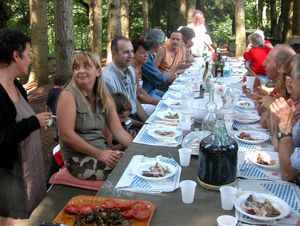I need that special place, but… nothing in the centre (too many tourists); nothing on the other side of town (that’s not our neighbourhood); nothing out in the country (it’s too far for a weeknight); nothing affordable (not special enough for the occasion); nothing new (what if it’s no good?) etc
There are no restaurants in Florence.
You heard correctly: Florence, a world-famous culinary capital, a city in which it is impossible to walk down the street without bumping into someone inspecting a menu, has no restaurants.
That is, no restaurants that are acceptable if your wife is Florentine, and it happens to be your anniversary.
I survive the process of choosing a restaurant. Once there, some pasta and a good bottle of wine and our special night out is a success? Hardly, our adventure has just begun! At the restaurant, many things await me that are far more diabolical than better-known challenges such as double parking or the constant white noise of cell phones ringing. The Italian tendency to compensate for chaos in some spheres of life with a maniacal sense of order in others, when brought to one of the rare areas in which national pride flourishes (food), can cause many a cultural-culinary disaster.
A simple example is the tourist’s habit of ordering that quintessentially Italian beverage, a cappuccino, after a big meal; unfortunately for them, a cappuccino is of course a breakfast thing, or at the very most a warm me up drink on a cold afternoon thing, and as such is clearly out of place after a few plates of pasta and a big bloody steak. More than once at the end of a feast of Homeric proportions I’ve eavesdropped on some variation of the following scene:
Culturally Unaware Tourist: “I’ll have a cappuccino, please.”
Condescending Waiter: “No, sorry, we’re all out of doughnuts.”
But many don’t know that, much more than the time of day, it’s the time of year that influences what you can order safely. Italians are still a half-generation or so away from having their food senses dulled by supermarkets. And they know what season it is.
The quaint, folksy, close-to-the-earth side of this heightened seasonal awareness is that you can ask the average Italian what fruit or vegetable is in season, and he’ll give you an annotated list, including recipes. The downside is that you run the risk of ordering a food when it’s not the right week, thus appearing extremely uncool. (“What? You want ham and melon?! Can’t you see that it’s late summer??”) The fact that this item is still clearly printed on the menu rarely provides salvation.
For those of you who didn’t grow up on a farm and would like to be in the loop, here are a few tips to get you started: no tomatoes in winter (forget that insalata caprese); no artichokes in spring; no broccoli in summer; no salad in the fall. And it’s not just fruits and vegetables: generally speaking, risotto is a winter thing too, so try to avoid it in August. Imagine strict rules governing the months in which you can order a cheeseburger to have some idea of what I’m talking about.
Wrong season is not the only danger, though; there is also wrong occasion. There are a whole series of things (lasagna, for example) that I can’t order because “these are things your grandma makes for you.” Whose grandmother, I’d like to know; certainly not mine. The worst offence would, however, be ordering something too healthy on occasions that call for serious eating. A grilled chicken breast belongs to the worst category, “things you eat in the hospital.”
Finally, the last stumbling block: ordering. A dangerous moment—one false move and my accent will give me away, one word and I will be transformed from a paying customer (to be addressed respectfully with the lei) into a schmuck (who is barely worthy of a tu). As a foreigner, I will be someone to ignore or, even worse, humiliate. Not even a jacket and tie could save me then. What to do? Tell my wife what I want and have her do the talking? Try to rehearse carefully what I’m going to say to the waiter in the hope that I can “pass” as Italian? Try to mumble and just point at something on the menu? Here comes the waiter.
Buon appetito.







